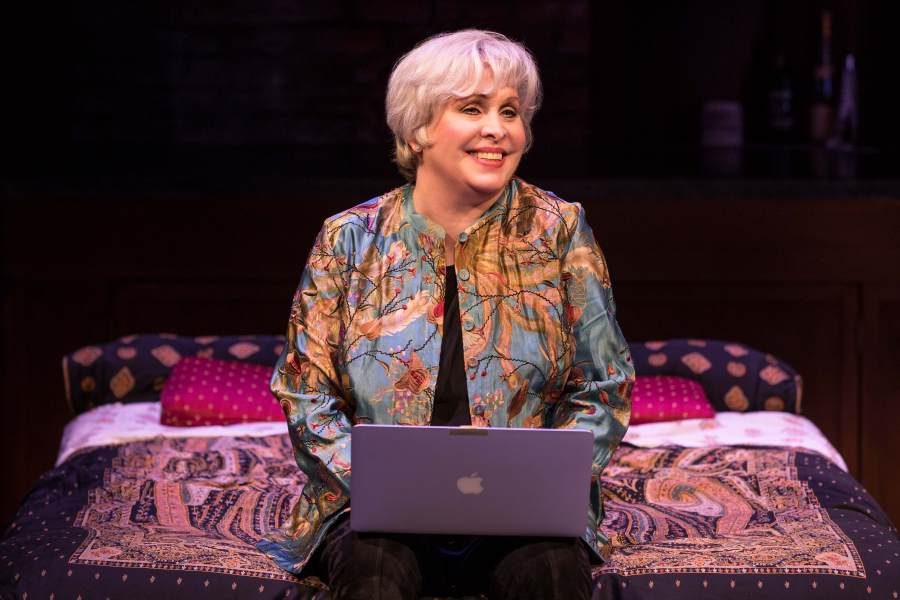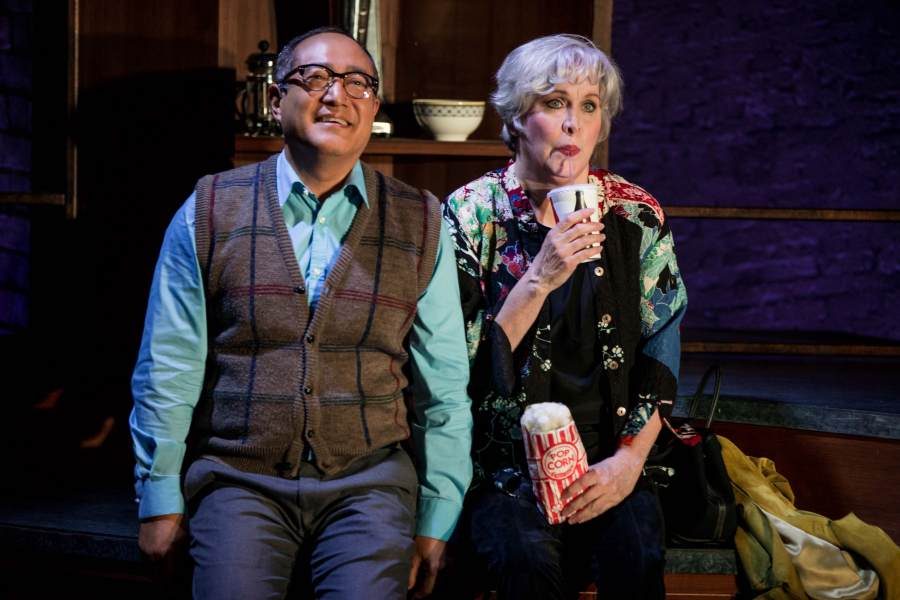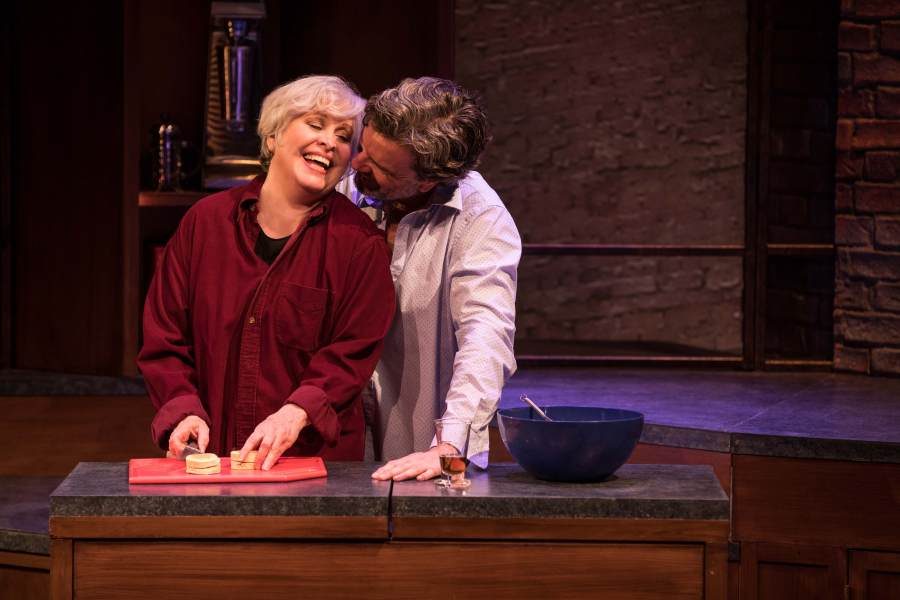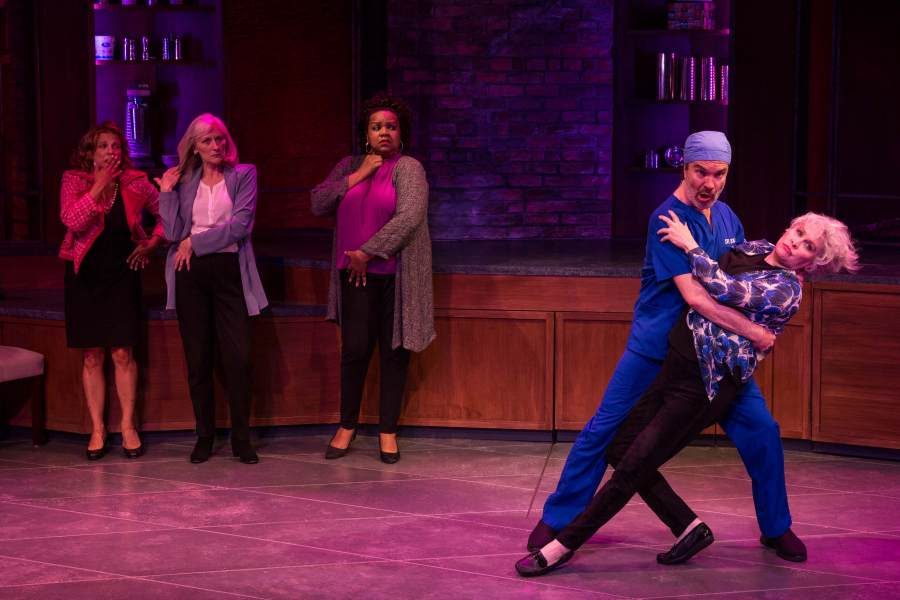

Broadway’s famed comedienne Nancy Opel has a long history of playing brassy broads, and her latest, Bobby Goldman, is as brash and bawdy as they come. As the titular character in the newly opened Curvy Widow, now playing at the Westside Theatre, Goldman is a no-nonsense, uber-confident 50-something who suddenly finds herself thrust back into singlehood when her neurotic writer husband meets his untimely demise. Through a series of hysterical complications, she attempts to navigate the modern dating world, as a way to “turn the page” and regain order in her life — all while her husband’s memory lurks in the background. Based entirely on true events — and written by Bobby Goldman, the Curvy Widow herself, no less! — this raunchy romp exudes as much heart as it does humor, and speaks candidly to a demographic that wouldn’t otherwise receive much of a platform. Below, Opel — with dog Momo at her side — speaks to that issue and how it feels to present it, while also, naturally, dishing on her trademark portrayal of flashy females, the show’s whirlwind production process, her own dating disasters, and much, much more.
You’ve been known, especially in the more recent years, to play big, brash no-nonsense women who always speak their mind. What is it that draws you to these roles? Are you happy to be branded with that “type”?
Well, it’s kind of a two-way street in that [regard]. I think, most notably, Urinetown was where I really started doing these big, crazy, over-the-top broads. It's really fun to do, it's incredibly enjoyable, but the other side of it is that you can only really play the roles that are out there being offered.
And an awful lot of the time, people my age tend to play a lot of evil stepmothers and that sort of thing. The job becomes about "what do you provide dramaturgically to make a story go forward?"
Like, for example, in Honeymoon in Vegas, you didn't see me all that often, but you know that [as Bea Singer] my hold over my son [Jack Singer, played by Rob McClure] was the thing driving the whole plot forward. Your character, honestly, is there to provide a foil, for whatever else is going on in the show.
So, for me, being able to do Curvy Widow was so refreshing, you know? The story isn't about a bunch of other people and the old lady is just helping out. Here, the old lady is front and center. She's the [real] deal. So, it was a really exciting opportunity to do something a bit different. You know, 'cause you don't see, certainly in musical theatre, a lot of women my age talking about the kind of stuff we talk about in the show. What an older woman is doing in bed is not necessarily the kind of thing people are writing about.
So, it was really exciting to present this [material], about someone who was really finding themselves... and who was a woman! It's [an idea that's] just kind of swept under the rug, or considered to be not as interesting, but I think there really is an audience for this story. We're certainly finding that out.
Similarly, in your opinion, what’s the key to nailing a comedic role?
Well, I love to play the big stuff. I really do. I mean, just look at my line of work. But I’ll tell you what’s key, what’s funny. What’s funny is playing the truth. Hearing people laugh because the universal truth, they recognize something within themselves. Like, it’s funny because it’s true, you know what I mean? And there’s a couple places in this show where we get enormous laughs, because people see themselves, see their issues in what we’re doing. And they just find it hilarious seeing it played out onstage.

What was it about this role, Bobby Goldman, and this show that made you say, “yes”?
Again, it’s that women of a certain age are often written off as being main characters. You can name two — maybe three — central female characters on one hand… I’m thinking of Mama Rose or Dolly Levi or roles like that. But for the most part, it’s really hard to come up with a whole lot of other [characters] who are women over 50 that drive a show. So, that [aspect] appealed to me.
Also, when Bobby Goldman wrote the show, I think that she was really thinking that was writing a little naughty romp about her exploits after her husband died. And it is that. But also — and I think this is a result of the alchemy between her and [composer/lyricist] Drew Brody — there are moments in the show where you go, “Oh! This is actually really deep too!” You know?
It answers the question, “What do you do when you’ve been a caregiver and you’ve been in a certain routine — a quotidian existence — doing your thing day after day, and then, suddenly, that’s taken away from you?”
And part of what I was finding interesting about the show was coming up with “What is the difference between being lonely and being bereft of a certain habit or habits?” You know, you think, “Oh, this must be bad. This must mean I need to find a replacement.”
And I think that part of that impetus is to not only fill the void of the person, but to fill the void of the habit, or the existence that you had before….exploring and playing with that [idea] was appealing to me, too.
And then, I also loved the fact that the show isn’t tied up easily. It doesn’t come to a “ride off into the sunset” sort of ending, which I really like, 'cause life isn’t always that way either. A woman nowadays, her life isn’t determined or defined by what man she’s with, or even if she has one at all, and I found that to be a very interesting point as well.
How do you feel playing an autobiographical role versus a fictional character? Does your character development process differ at all?
Let me first say that I clean her act up quite a bit. [Bobby] would laugh if I said that, but it's true. (laughs) She says I get away with all of these things that I talk about in the show, because I bring sort of a corn-fed wholesomeness to all of this (laughs). And I do soften her edges in a way.
But no, no, it doesn't [change my process]. Here's the thing: A character is a character. And as I was saying earlier, no matter how big or crazy or briefly written things are — again, Honeymoon in Vegas I think I was onstage for seven minutes — you're there to have your moment and make your point. And I'm happy in this sense to be able to really show a person, a real person's whole process and their journey throughout the 85 minutes of this show, because I think that we really do take audiences on a ride, and it’s fun to live that and show that. It’s nice to be able to have the really funny highs and enjoy that [and] take that in 'cause that’s the stuff I always do, but also, to then be allowed to have these really profound moments of seriousness, too, and play both sides of that.
But as to how I approach the role… No, I don’t think that [process] changes. Again, a character is a character.

What’s it been like for you to see this show through its three iterations (NC Stage Company in Asheville, NC, George Street Playhouse in New Brunswick, NJ, and now at the Westside Theatre in New York)? How has the character grown or changed in your eyes?
It’s an interesting thing when you’re first setting out on the trail, as it were. You’re looking at a script [in terms of] what your path is going to be and how you’ll get through it — I always try to find signposts in the script and in the music and follow the trail that has been created for me. But the longer you do it, the more sure-footed you are on the trail, and then, you’re able to actually provide insight into what you think the next step might be.
Each run has been really great, and this cast and crew have been very easy to work with. We’ve had a really great give and take in this process.
The collaboration on this character with everyone involved has been pretty remarkable. If I think, “Could I say this instead of this?” by and large, everybody’s okay with it. I’ve thought of jokes for [every iteration of] the show and they’re in, you know?
She’s coming to life more and more with each production because the route that we’re going with her becomes more clear with each go-around. It’s been easier, or perhaps I should say more streamlined, each time, as you further develop and get to know the character — this person that you’re creating onstage.
In the show, Bobby Goldman certainly has a series of what we’ll call “dating disasters.” Do you have any particular mishaps à la Bobby that you can share?
Um… I’ll tell you what. I think this answer will suffice. I was on OKCupid for exactly one month, and I found it to be so deeply disturbing (laughs). It [was] absolutely horrific and it created such anxiety within me that I gave it up really quickly. Because, let me tell you, men are…well…we say it in the show, “Single men my age are awful.. there’s a reason that they are alone.” And that, in my experience, has been pretty true (laughs).
But, to be honest, I didn’t work that hard at it either. Of course, women my age in the world so often wear the cloak of invisibility that it’s rather difficult to meet people anyway (laughs).

Can you speak about what it means to be playing a leading lady, front and center, in a show dealing with poignant themes relevant to female experience, especially at this pivotal time in our history?
I think it’s just exciting, especially to have people come and see that point of view. Certainly, I would say people who have lived as long as I’ve lived totally get it, or at the very least, certain facets of it. Because, given that we’re adults, we’ve all experienced some form of heartbreak and loneliness. So, I think that’s universal. And then, for a show to base itself so much in these issues… 'cause we’re not leaving out anything from this 50+ woman’s life. We’re talking about everything, and a lot of times, in a humorous way.
And then, you know, everyone in the show is over 50 years old, period. Do you know what I mean? There aren’t any young person foils in it because we all think you’re gonna get bored of watching the old folks. No, this is our show. And it’s about people of our age. And we’re interesting. And funny. And naughty. And we still want to have sex.
And what’s interesting, too, and why I think it’s so poignant is that there really isn’t any of this out there. But again, that’s not why it was written. It was being written anyway, you know? ‘Cause [Bobby] had a story to tell.
It’s just like you write anything. Though I’m not a writer, but I don’t think anyone sets out to write for a niche. You just write the thing that inspires you. People like Stephen Schwartz and Lin-Manuel Miranda will tell you the same thing.
You’re hoping people will like it, but you have no idea what kind of impact you might have on people. And I think we’ve succeeded in doing that with our little show. It’s just all come together so fast. It’s just incredible. I’m really proud of it.
What do you hope that people — and perhaps, given the subject matter, women in particular — take away with them after seeing this show?
I'm going to say — and this surprised me when I [first] heard it, but I hope it's true for other people — that even through all the laughing and the ridiculousness and all the foibles and the falling down, people say, "This gives me hope." That's really something I feel audience members have felt.
So, I would hope that people would take away [the feeling that] you don't have to give up on anything that you want in your personal life. Just know that's there's going to be a tomorrow and you can make all kinds of choices for yourself.
And you always hope for that. You hope that someone might shed a couple of tears and be moved by the material, but also that they'll laugh a lot and realize it's not all bad. There's always a light at the end of the tunnel.
Finally, in the spirit of the show, just as Bobby Goldman has Curvy Widow, what would the Match.com handle be for Nancy Opel?
(laughs) Oh no, man! You didn’t! (laughs) Okay. Let’s do this. You know what I think it’d be? SadderButWiser. (laughs) How’s that for you? I think that pretty much sums it up.